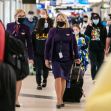Anyone who chose to or had to take an airplane during the pandemic was nervous. But the airlines reassured everyone that the air up there was safe to breathe. One study from the Massachusetts Institute of Technology, for example, found that the chances of getting COVID-19 on a plane were less than one in one thousand. Now that the disease is waning, is it even safer to breathe airplane air? Sadly, no. But new legislation proposed in both the U.S. House Representatives and the Senate has found another reason to worry and aims to do something about it.
To understand the problem, it is necessary to learn a bit about where the air in passenger and crew cabins comes from. It originates in the plane’s jet engines and is safe when everything is working as it is supposed to. But any mechanical problem can cause the engines to leak fumes, oil, de-icing agents and various other fluids. When that happens, the air can become contaminated and release toxic gasses into the plane’s air circulation systems. Passengers and crew then breathe it.
And there are no sensors on airplanes to detect the noxious fumes. The only way current airline personnel know something is wrong is when they smell it.
New legislation, the Cabin Air Safety Act of 2023, sponsored by Richard Blumenthal (D-Ct.), Edward Markey (D-Ma.) and Dianne Feinstein (D-Calif.) in the Senate and Brian Fitzpatrick (R-Pa.), Kaiali'I Kahele (D-Hawaii), Don Bacon (R-Neb.), John Garamendi (D-Calif.) and other bipartisan members of the House was introduced in March.
According to a press release by Senator Blumenthal, “Our bill would mandate thorough investigation of cabin air quality reports, proper training and resources for airline crew, and installation of air quality monitoring equipment and detectors on commercial flights to ensure the public and crewmembers are protected from these harmful fumes, smoke, or other contaminants.”
A recent investigation by the Los Angeles Times helped prompt the new bill. Its reporting disclosed that “dangerous vapors contaminate the air supply on planes with alarming frequency.” It can make passengers ill and even incapacitate pilots during flights. The reports disclosed that 400 pilots, flight attendants and passengers sought medical attention due to fumes in a recent two-year period.
The Times explained that heated jet engine oil contains tricresyl phosphate, or TCP, which is a “highly toxic chemical” that can damage the nervous system and/or cause tremors, memory problems and brain damage. Short-term exposure can cause headaches or dizziness.
Many homes and offices have carbon monoxide and other detectors of noxious gasses, but thus far, airlines lack the requirement.
The Cabin Air Safety Act says that no later than 180 days after the bill is enacted, the Federal Aviation Administration (FAA) must create regulations that require airline flight personnel to receive training, at least once every year, on how to respond to fume-related events. The training would cover how to find and identify smoke, fumes, odors and visual occurrences as well as what to do about them. It also requires the FAA to continue to research and develop sensors, onboard detectors and other much-needed warning systems.
Under the bill, when incidents are reported, the FAA, at its “discretion” must conduct an investigation if one or more crew members or passengers have symptoms that require medical attention. The bill also calls for public comment about proposed regulations that will be placed in the Federal Register. These call for the installation and operation of “onboard detectors and other air quality monitoring equipment” that will keep track of carbon monoxide or other gases that are “dangerous to human health.” In addition, all findings would become part of the public record and be available on an internet website that is to be created.
The bill targets not only airline personnel but aircraft manufacturers as well. Those who manufacture planes must include required air quality monitoring equipment, install alarms and develop appropriate manuals and training materials.
The new legislation would require airlines to develop a “standardized form” for reporting incidents to create and follow up on reported incidents. These would be used to assure that proper corrective measures are taken. Collective bargaining representatives would be alerted about reported events. The Times reports that “major unions across the industry representing pilots, flight attendants and mechanics” favor the legislation. It requires the FAA to continue to research and develop sensors, onboard detectors and other much-needed warning systems.
The 2023 Cabin Air Safety Act is not a new idea. Similar legislation was proposed in 1994 and 2003, but according to the Times, it “languished in committee.” A representative of the air carriers’ lobbying group “Airlines for America,” called the proposed legislation “premature in the absence of scientific studies that validate a health concern, relatable and accurate sensor technologies, and detection standards.” Boeing also told The Times that “scientific studies have not proved a link between fume events and health problems.”
As summer travel plans loom in the near future, perhaps it’s time to think about a good old-fashioned road trip.






